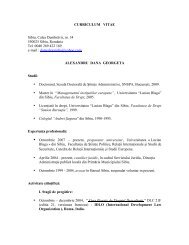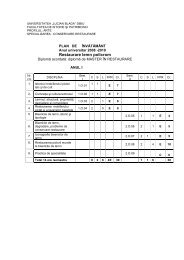Download - Facultatea de Științe Socio-Umane - Universitatea ...
Download - Facultatea de Științe Socio-Umane - Universitatea ...
Download - Facultatea de Științe Socio-Umane - Universitatea ...
You also want an ePaper? Increase the reach of your titles
YUMPU automatically turns print PDFs into web optimized ePapers that Google loves.
Military Justice, Regulations and Discipline in Early Mo<strong>de</strong>rn Transylvanian Armies ...<br />
Some military regulations were issued during the preparations for new campaigns,<br />
especially the ones organized against external enemies. Such occasions were frequent<br />
in the second half of the XVII century, during the reign of Mihail Apafi, when the<br />
Transylvanian army took part in several military actions directed against the<br />
Habsburg rule in Hungary. In 1671 the soldiers of the principality were being<br />
summoned for a campaign in the region of Partium. While the troops were mustering<br />
in the camp at Some eni (Szamosfalva) near the town of Cluj, the prince and his<br />
advisors conceived a regulation consisting of 13 articles for this specific campaign. A<br />
notable difference from the regulations analyzed earlier, is the attempt to impose a<br />
moral co<strong>de</strong> for soldiers. The first rules were stating that soldiers guilty of adultery and<br />
those cursing in the name of God had to be punished by <strong>de</strong>ath. Same punishment was<br />
applied in cases of insubordination. Another problem that this regulation was trying to<br />
prevent was the spreading of false rumors. The morale of the army was easily<br />
influenced by unfavorable news, both true and false. Each soldier was bound to<br />
communicate external information exclusively to his superior officer. Those found<br />
guilty of spreading rumors or bad news insi<strong>de</strong> the camp were punished by beating,<br />
and if the rumors were grave enough they could also be executed. Fights between<br />
soldiers and theft were punishable by <strong>de</strong>ath 16 .<br />
Although a permanent legislation regarding the internal or<strong>de</strong>r of armies in this<br />
period was never achieved, the regulations analyzed here show multiple similarities,<br />
fact which <strong>de</strong>monstrates a constant effort of political authorities (both the prince and<br />
the representatives of estates) to impose a more efficient control on their military<br />
power. Discipline was without a doubt the most important objective of these<br />
regulations, but other matters such as: supply, logistics, camp security and reducing<br />
the negative impact on civil population, were also taken in. to consi<strong>de</strong>ration. The<br />
<strong>de</strong>gree in which these rules were applied and respected remains a fact hard to asses.<br />
In spite of these obvious efforts to contain the <strong>de</strong>structive behavior of early mo<strong>de</strong>rn<br />
soldiers, official and narrative contemporary sources continued to present a negative<br />
image of armies in this period 17 .<br />
16 Ibi<strong>de</strong>m, vol. XV, Budapest, 1892, p. 204-205; some similar regulations were issued in the years 1681<br />
and 1683. Sándor Szilágyi , Az erdély 1681-ik hadjárat előkeszületéinek történetéhez, in<br />
„Hadtörténelmi Közlemények”, IV, Budapest, 1891, p. 415-420; MCRT, vol. XVIII, doc. XIV, p. 136-<br />
141.<br />
17 This work was possible with the financial support of the Sectoral Operational Programme for Human<br />
Resources Development 2007-2013, co-financed by the European Social Fund, un<strong>de</strong>r the project number<br />
POSDRU 89/1.5/S/60189 with the title „Postdoctoral Programs for Sustainable Development in a<br />
Knowledge Based Society”.<br />
189





